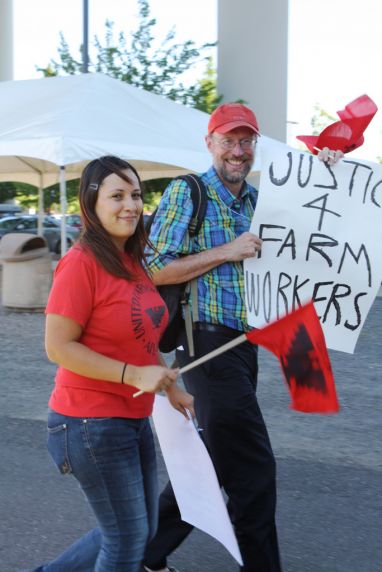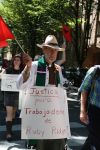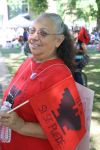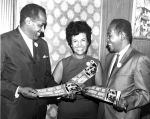NHPRC Oral History Project: An Update from the (Wave) Field
In 2014 the National Historical Publications and Records Commission awarded the Walter P. Reuther Library its two-year Documenting Democracy grant to enhance access to the library's oral history collections, thus enabling my hiring. As Oral History Project Archivist, I’m lucky enough to get to “unearth” some of the great treasures of our collections. Thanks to the grant, I am arranging and describing more than 1,600 previously undescribed or “under-described” oral histories in our collections. I started work on this project back in the spring, learning about the Reuther’s collections, systems, and procedures, and most importantly, getting to know the oral histories and my coworkers at the Reuther Library, several who serve with me on the Oral History Project Team, and all of whom have assisted me so far with some aspect of my work.
The oral histories come in all shapes and sizes, with formats ranging from audiocassettes and even some reel-to-reel tapes to MP3 and WAV digital files, along with transcripts in either print or digital format, or sometimes both. Some oral histories even consist of video interviews, mostly on VHS videocassettes, but in other formats as well. The topics covered primarily relate to labor history (a broad area that includes subtopics such as the automobile industry, migrant labor, the environment, and women’s issues, among many others), with life in Detroit also being well represented.
Some oral histories are already described in various “legacy” systems, such as databases, spreadsheets, or simple lists, but these descriptions are not necessarily accurate or complete. For these collections, I track down the information in all the various places it could be – along with the collection itself, which sometimes takes a bit of hunting, too – verify the collection information, make corrections and additions as needed, and enter the updated description into our archival collections management system, ArchivesSpace, following modern descriptive standards along with procedures hammered out by me and the rest of the project team, with whom I meet regularly to track and celebrate the project’s progress. Once the records are in ArchivesSpace, the librarian assisting us with the project exports them to a format (MARC) that can be viewed in the Wayne State Library System’s catalog, as well as the global library and archives access systems WorldCat and ArchiveGrid.
Other oral histories have no description at all beyond what I find in the case files, which can range from almost nothing beyond a couple of pieces of donor correspondence to voluminous documentation of the oral history project and signed consent agreements, or “releases,” for every participant. For these collections, I organize the materials as needed, create my own description, and enter that description into ArchivesSpace, too. (Speaking of releases, one of the challenges in providing access to oral histories is the frequent lack of interviewee releases. Without these documents, access to and use of an interview may be severely limited. I urge everyone undertaking or contemplating an oral history project to ensure that all of their participants are informed of the end use or uses of their oral history interviews and sign off on a formal agreement that is in accordance with the project aims and the interviewee’s own wishes. History—and archivists—will thank you!) Another important aspect of my work is making sure the collections themselves are organized and stored properly and are in good physical condition. If work needs to be done on something, I either take care of it on the spot—rehousing materials into acid-free folders and boxes, for example—or else make a note of preservation concerns for future work, be it reformatting of a decaying physical medium to digital (the usual case) or requesting conservation assistance for the original media (more rarely).
One of the interesting collections I’ve completed work on is the National Farm Workers Ministry 40th Anniversary Oral Histories, a collection created in 2011 as part of the observances of the organization’s 40th year as a national organization, but with more than 90 years of service as a whole. The National Farm Worker Ministry (NFWM) describes themselves as “a faith-based organization committed to justice for and empowerment of farm workers” that “educates, equips and mobilizes member organizations and other faith communities, groups and individuals to support farm worker led efforts to improve their living and working conditions.” The Reuther Library holds the NFWM records, along with this particular oral history collection. The collection consists of ten oral history interviews that were conducted with NFWM staff, board members, organizers, and supporters across the country. There are recordings and transcripts for each interview, along with portraits of the interviewees, often showing them engaged in action, as in the images above. Interviewees recount how they first got involved with NFWM, how their beliefs and values have affected their involvement, how they in turn have been affected by their involvement, and what they would say to people who might be thinking about becoming involved. They also discuss such topics as conditions facing farm workers today, their views on the farm worker movement as it relates to other movements and global events, and their hopes for the future of the farm worker movement. The NFWM’s own website also features its oral history project, with images and audio clips.
In addition to its ministry and service roles, NFWM has played an active role in organizing farm workers and supporting striking farm workers, including through educational efforts and coordinating boycotts.
On a related note, the Reuther Library currently has a small exhibit outside of its reading room showcasing materials from the United Farm Workers (UFW), an organization the NFWM naturally has worked with closely. The display commemorates the fiftieth anniversary of the legendary Great Delano Grape Strike that began in California in September 1965. It features materials from and about the strike as well as items from later in the UFW’s history. The exhibit runs for the next three months and is viewable during our reading room hours.
Please direct questions or comments about the oral history collections to Kristen Chinery, Reference Archivist.





 Reddit
Reddit Facebook
Facebook LinkedIn
LinkedIn